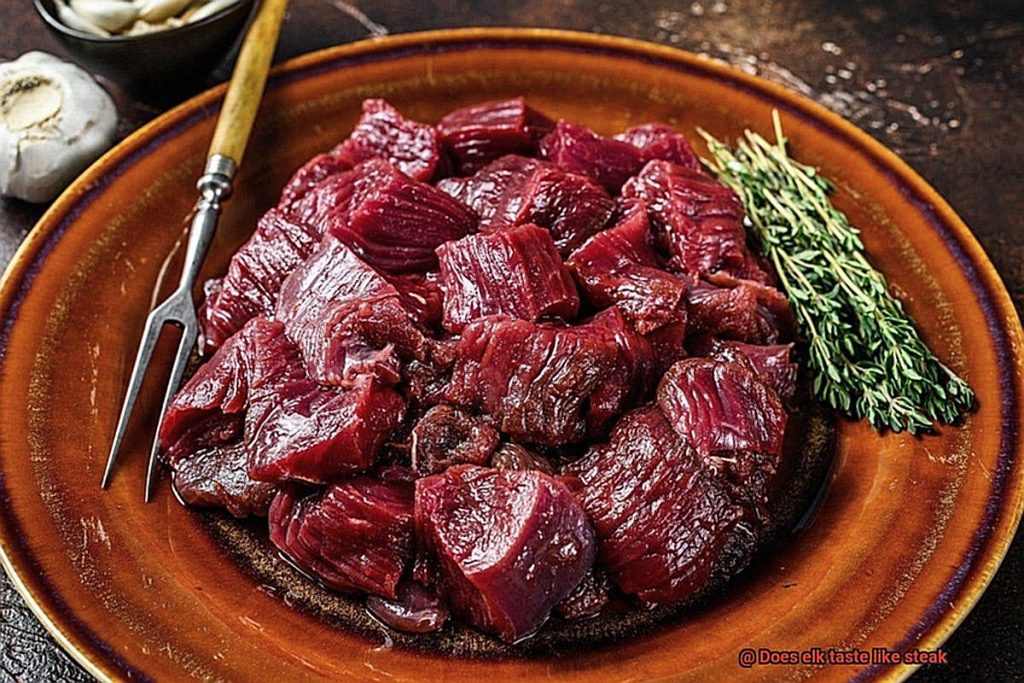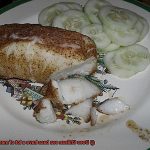Today, we set out on a wild adventure to answer the burning question that has piqued our curiosity: Does elk truly taste like steak, or does it offer an experience worthy of separate praise?
Picture this: tender, juicy, and bursting with flavor – that’s what comes to mind when we think of a classic steak. But for those with a daring palate and a hunger for something extraordinary, elk has emerged as an intriguing alternative. So buckle up and get ready to embark on a journey where we uncover the secrets behind this majestic creature’s meat.
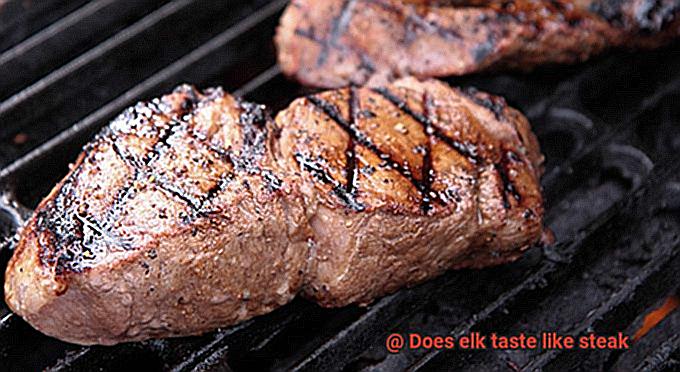
Elk, revered in the wilderness as a symbol of grace and strength, has found its way onto modern dining tables as a sought-after protein source. Its robust flavor and lean tenderness have captivated both food connoisseurs and health-conscious individuals alike. But can it hold its own against the iconic taste of perfectly cooked beef steak?
In this article, we’ll dive deep into the captivating world of elk meat – exploring its texture, flavor notes, cooking techniques, and even how factors like diet and age can influence its taste. We aim to provide you with a comprehensive analysis that will help you make an informed decision about incorporating elk into your diet or seeking out a unique dining experience.
So join us on this sensory journey as we unravel the mysteries behind elk’s intriguing flavor. Get ready to tantalize your taste buds and discover new horizons in your culinary adventures. Whether you’re curious about alternative meats or simply seeking an unforgettable gustatory experience – this is the place for you.
Are you ready? Let’s venture forth into uncharted territory where elk meets steak.
Contents
What is Elk?
Elk, also known as wapiti, is a majestic and revered species of deer that roams the wilderness of North America and parts of Asia. With its impressive antlers and robust build, the elk has long captured the attention and awe of hunters, wildlife enthusiasts, and nature lovers alike.
These magnificent creatures are herbivores, feasting on a diet of grasses, leaves, bark, and twigs. They are highly adaptable, able to thrive in various habitats including forests, meadows, mountains, and even deserts. Their migratory behavior is awe-inspiring, as they navigate between higher elevation summer ranges and lower elevation winter ranges in search of food and more favorable conditions.
Male elk, called bulls, are easily distinguishable by their large antlers that they shed and regrow every year. These antlers serve as a symbol of dominance during the mating season when bulls engage in fierce battles for access to females, known as cows. Female elk, on the other hand, do not possess antlers and are referred to as cows. They typically give birth to a single calf each year.
In addition to their captivating appearance and behavior, elk also hold culinary value. The meat of these magnificent creatures is highly regarded for its lean and tender characteristics. Elk meat has gained popularity among food enthusiasts who appreciate its rich flavor and health benefits. With less fat and cholesterol compared to beef, elk provides a healthier alternative for those conscious about their diet. Its flavor profile is often described as robust but not as gamey as venison or other wild game meats.
Flavor Profile of Elk
Elk, with its distinct and rich flavor, is often compared to beef but possesses unique characteristics that set it apart. This sought-after meat offers a taste experience that is both familiar and different, making it a popular choice for those seeking something new on their grill.
One factor that contributes to the flavor profile of elk is the age of the animal. Younger elk tend to have a milder flavor, while older ones boast a stronger and more gamey taste. This gamey flavor is reminiscent of the wild and is often described as earthy and herbaceous, derived from the animal’s natural diet of grass, leaves, and shrubs. It is this natural diet that gives elk meat its slightly wild and robust taste.
Another distinction between elk and beef lies in the leanness of the meat. Elk meat contains less fat marbling, resulting in a slightly different texture and mouthfeel compared to steak. Although this lean nature can make elk slightly tougher if not cooked properly, when prepared to medium-rare or medium doneness, it becomes tender yet firm, offering a satisfyingly chewy bite.
Described as sweeter and more delicate than beef, elk’s flavor carries a hint of gaminess that adds depth and complexity to every bite. This gaminess, however, is not overpowering like other wild game meats, making elk an ideal choice for those who prefer a milder flavor. Its versatility further enhances its appeal—elk pairs well with various seasonings and marinades, allowing for diverse cooking styles such as grilling, pan-searing, or roasting. The rich taste of elk can also be enhanced by incorporating herbs and spices that complement its natural earthy undertones.
Texture of Elk Compared to Beef Steak
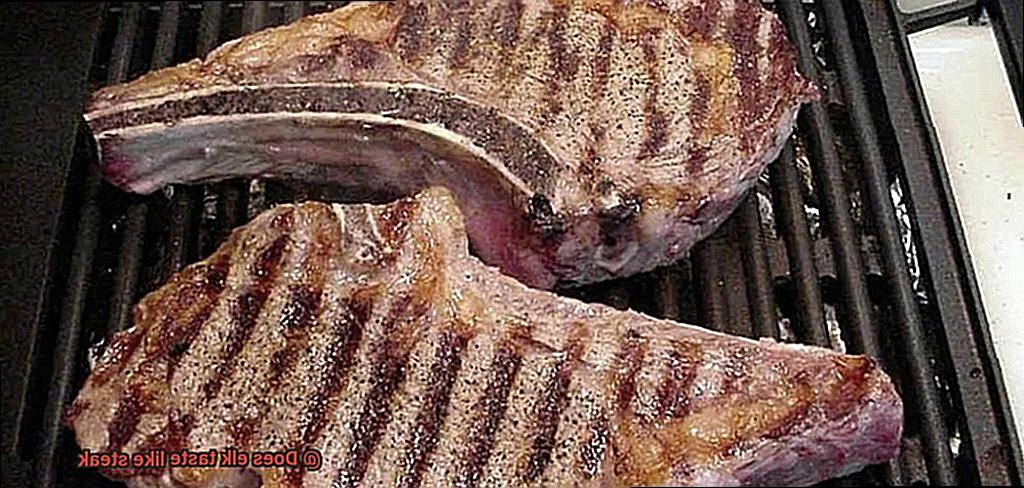
Firstly, elk meat is leaner than beef steak, meaning it has less fat interspersed throughout the meat. This results in a slightly firmer texture compared to the more tender and buttery texture of beef steak. Imagine sinking your teeth into a velvety piece of elk meat, its fine grain offering a satisfying resistance.
But don’t let its leanness fool you. Despite being lean, elk meat is known for its tenderness and moisture. Cooked properly, it becomes incredibly tender and juicy, making it a popular choice for grilling. Picture biting into a perfectly cooked elk steak, its succulent juices bursting with flavor.
However, cooking elk meat requires some consideration. Due to its leanness, it can become tough and dry if overcooked. To preserve its tenderness and juiciness, it’s important to cook elk meat to medium-rare or medium doneness. Be mindful of the cooking time as well, as elk can cook faster than beef due to its lower fat content.
The texture of elk meat also varies depending on the cut. Tender cuts like the loin or ribeye will have a softer and more melt-in-your-mouth texture. On the other hand, tougher cuts like the shoulder or shank will require longer cooking times to achieve a tender result. Each bite offers a unique textural experience.
Tips for Cooking Elk
Elk is a lean meat that can easily dry out if overcooked. To ensure tender and juicy results, cook elk to medium-rare or medium doneness. Overcooking can result in tough and dry meat, so be mindful of the cooking time.
Marinating Magic: Enhancing Flavor and Tenderness
Marinating elk before cooking can work wonders in enhancing its natural flavors and tenderness. Create a simple marinade using olive oil, garlic, herbs, and spices. Allow the meat to marinate for a few hours or even overnight to maximize flavor infusion.
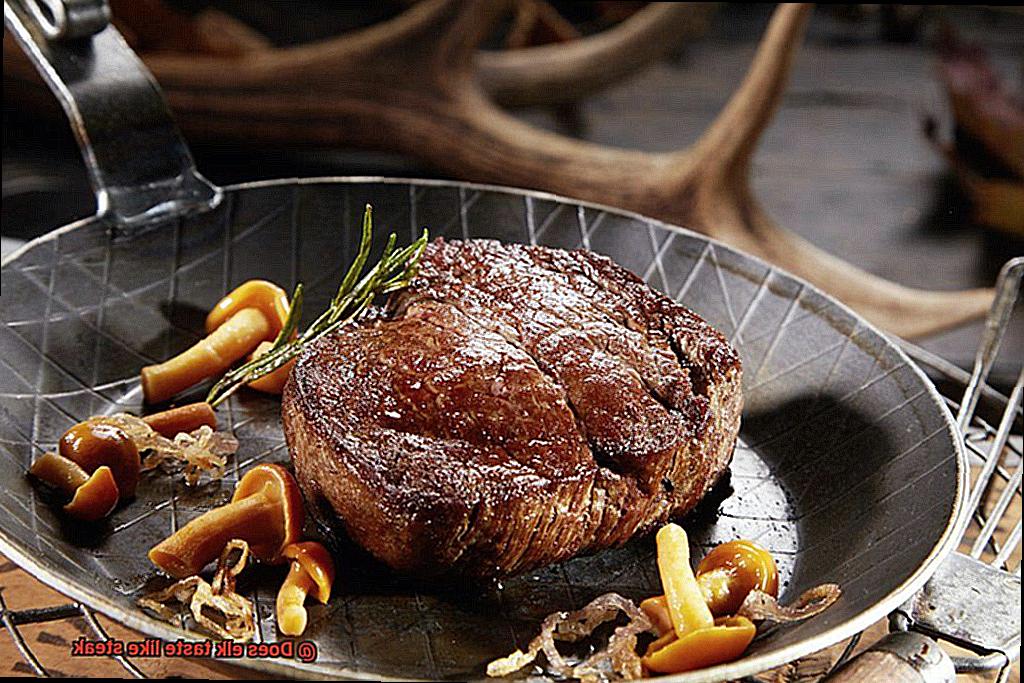
Grill Like a Pro: High Heat and Smoky Goodness
When grilling elk steaks or burgers, preheat the grill to high heat. This creates a nice sear on the outside of the meat and helps seal in the juices. To prevent sticking, oil the grates before placing the elk on the grill. Cook elk steaks for about 3-4 minutes per side for medium-rare doneness.
Resting is Essential: Tenderizing and Locking in Juices
After grilling, let the elk rest for 5-10 minutes before slicing or serving. This crucial step allows the juices to redistribute throughout the meat, resulting in a more tender and flavorful outcome.
Seasoning Sensations: Complementing Elk’s Unique Taste
To enhance the robust flavor of elk, season it generously with salt and pepper before cooking. Consider using herbs like rosemary, thyme, or spices like black pepper to complement its unique taste. For a balanced flavor profile, add a touch of sweetness such as honey or maple syrup.
Embrace Variety: Explore Elk’s Versatility
Elk is a versatile meat that can be used in various dishes. From steaks and burgers to stews and stir-fries, the options are endless. Experiment with different cooking methods and recipes to discover new flavors and textures.
Marinating Elk Meat
Marinating elk meat is a game-changer when it comes to enhancing its flavor and tenderness. The distinct taste of elk, described as rich, gamey, and slightly sweet, can be taken to new heights with the right marinade. Marinating helps balance out any gaminess, making the meat more palatable for a wider range of tastes.
When marinating elk meat, it’s essential to choose a marinade that complements the natural flavors of the meat. The base of the marinade should include acidic liquids like vinegar or citrus juice. These ingredients not only add flavor but also help tenderize the meat by breaking down its connective tissues.
To create a mouthwatering marinade, combine the acidic component with oil, herbs, spices, and aromatics. Soy sauce, Worcestershire sauce, garlic, rosemary, thyme, and black pepper are all excellent choices. Feel free to experiment with different combinations to find your perfect flavor profile.
Once you’ve prepared your marinade, it’s time to let the elk meat soak up all those delicious flavors. It’s best to marinate the meat for at least 4-6 hours or overnight to ensure full penetration. Remember to refrigerate the elk meat while marinating to prevent bacterial growth.
To ensure that every inch of the meat is coated in the marinade, use a sealed container or a zip-top bag. This allows for easy turning and coating during the marinating process.
After marinating, it’s time to cook your elk meat to perfection. Grilling is an excellent option as it adds a smoky goodness to the already flavorful meat. Just be careful not to overcook it since elk is leaner than traditional cuts of beef. Letting the meat rest before slicing will help lock in those juicy flavors.
Grilling Elk Meat
Grilling elk meat is not only a delicious way to enjoy this lean and flavorful protein, but it also offers a unique culinary experience. To ensure the best results, there are several factors to consider.
One of the first steps in grilling elk meat is marinating it properly. Elk meat can have a slightly gamey flavor, and marinating helps to enhance its taste and tenderness. A simple marinade of olive oil, garlic, soy sauce, and herbs can work wonders in adding flavor to the meat. It’s recommended to marinate the meat for at least a few hours or overnight to allow the flavors to fully penetrate.
When it comes to cooking time and temperature, elk meat requires attention. Due to its leanness, elk meat can easily become dry and tough if overcooked. It’s best to grill the meat on medium-high heat for a shorter period of time, around 6-8 minutes per side for a medium-rare doneness. This ensures that the meat remains juicy and tender while still achieving a nice charred exterior.
Allowing the elk meat to rest for a few minutes after grilling is also important. This allows the juices to redistribute within the meat, resulting in a more flavorful and succulent final product. Simply tenting the grilled elk meat with aluminum foil for about 5 minutes before serving can make a noticeable difference in its overall texture and taste.
In terms of seasoning, elk meat pairs well with a variety of herbs and spices. Classic steak seasonings such as salt, black pepper, and garlic powder can be used to enhance the natural flavors of the meat. Additionally, herbs like rosemary, thyme, and sage can add depth and complexity to the overall taste profile.
Lastly, it’s worth noting that elk meat is best cooked to medium-rare or medium doneness. Overcooking the meat can result in a dry and tough texture, diminishing the enjoyment of its natural flavors. Using a meat thermometer to ensure the internal temperature reaches around 135-140°F for medium-rare or 145-150°F for medium doneness is essential.
Benefits of Eating Elk Meat
Step into a world of culinary delight and discover the remarkable advantages of including elk meat in your grilling repertoire. Not only does this lean and nutritious meat offer a tantalizing flavor experience, but it also boasts an array of health and environmental benefits that will leave you craving more. Let’s explore why elk meat deserves a prominent place on your grill:
- Lean and Nutritious: Leave behind traditional beef steak and embrace the healthier option of elk meat. With its low fat content, it serves as an excellent source of protein, iron, and essential nutrients that support your overall well-being.
- Lower in Calories: For those conscious of their calorie intake or embarking on a weight loss journey, elk meat is an ideal choice. Its lower calorie count per serving compared to beef steak allows you to savor a fulfilling meal without fretting over excessive calorie consumption.
- Heart-Healthy Omega-3 Fatty Acids: Elevate your cardiovascular health with elk meat’s rich abundance of omega-3 fatty acids. These powerful compounds work wonders by curbing cholesterol levels, reducing inflammation, and mitigating the risk of heart disease.
- Vitamins and Minerals Galore: Delve into a treasure trove of vitamins and minerals when you indulge in elk meat. Loaded with vitamin B12, zinc, selenium, and more, it fortifies your immune system, fosters cell growth and repair, and ensures your well-being remains at its peak.
- No Added Hormones or Antibiotics: Bid farewell to concerns about added hormones or antibiotics when you opt for elk meat. Unlike its beef counterpart, elk meat typically remains untouched by these additives, making it an appealing choice for those who prioritize organic or naturally raised meats.
- Unique Flavor Profile: Embark on a culinary adventure with elk meat’s distinctive taste experience. Slightly sweeter and milder than traditional beef steak, it offers a refreshing alternative for those seeking a break from the ordinary or a chance to tantalize their taste buds with new flavors.
- Faster Cooking Time: Revel in the efficiency of elk meat’s leanness as it speeds up your cooking process. Unlike beef steak, elk meat cooks faster, making it an ideal choice for time-pressed individuals or those who prefer their meat cooked medium-rare or rare.
- Sustainable and Ethical: Embrace the virtuous cycle of sustainability and ethics when you indulge in elk meat. Hunters and outdoor enthusiasts appreciate its benefits as it provides a sustainable source of protein while ensuring the careful management and conservation of these majestic creatures.
Disadvantages of Eating Elk Meat
It is crucial to shed light on the potential drawbacks associated with consuming this game meat. This article aims to delve into various disadvantages of eating elk meat, including its cost, texture, flavor, health concerns, availability, and ethical considerations.
- Cost: One significant drawback of elk meat is its price. Limited availability and the expenses involved in hunting and processing make elk meat pricier than conventional meats like beef or chicken. This higher cost may deter some individuals from incorporating elk into their regular diet.
- Texture: Elk meat’s lean profile can be both advantageous and disadvantageous. While some appreciate its leanness, others may find it less flavorful or succulent compared to well-marbled steak. Moreover, due to its leanness, elk meat tends to dry out during cooking, demanding meticulous attention to avoid toughness.
- Flavor: Elk meat boasts a distinctive gamey flavor that distinguishes it from beef. While some individuals relish this unique taste, others may find it overpowering or unappealing. Personal preference plays a significant role in determining whether one appreciates or dislikes the flavor of elk meat.
- Health Concerns: Owning to its wild nature, elk meat carries a higher risk of parasites and diseases compared to commercially raised meats. Proper handling, storage, and cooking techniques are imperative to mitigate the risk of foodborne illnesses associated with consuming elk meat.
- Limited Availability: The availability of elk meat can pose challenges for those keen on trying it outside regions where it is commonly consumed or hunted. This restricted availability makes it arduous for individuals in certain areas to access and savor this type of meat on a regular basis.
- Ethical Considerations: Some individuals may harbor ethical concerns regarding elk meat consumption, primarily concerning hunting practices and environmental considerations. It is essential for consumers to conduct thorough research and grasp the sourcing and sustainability of elk meat before making a decision.
Conclusion
In conclusion, when it comes to the question of whether elk tastes like steak, the answer is a resounding yes.
The rich and succulent flavor of elk meat closely resembles that of high-quality steak. With its tender texture and robust taste, elk offers a unique and satisfying dining experience.
Whether grilled, roasted, or pan-seared, elk can be cooked to perfection, resulting in a mouthwatering dish that rivals any prime cut of beef.

